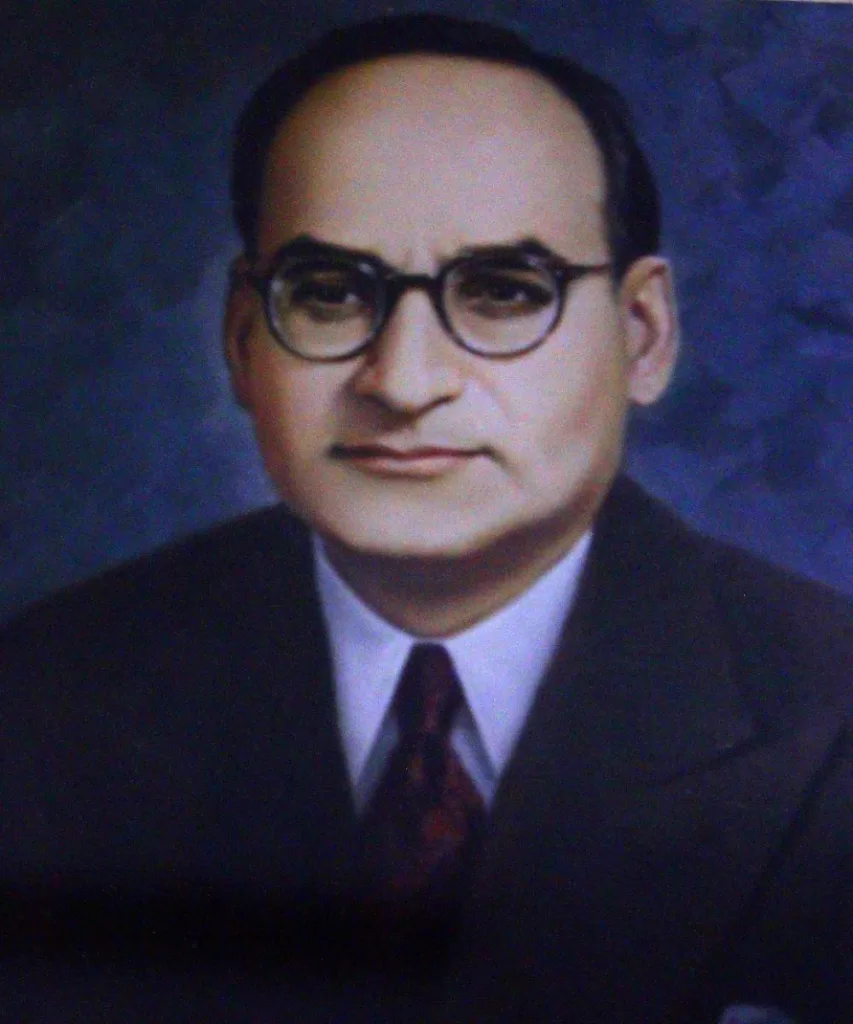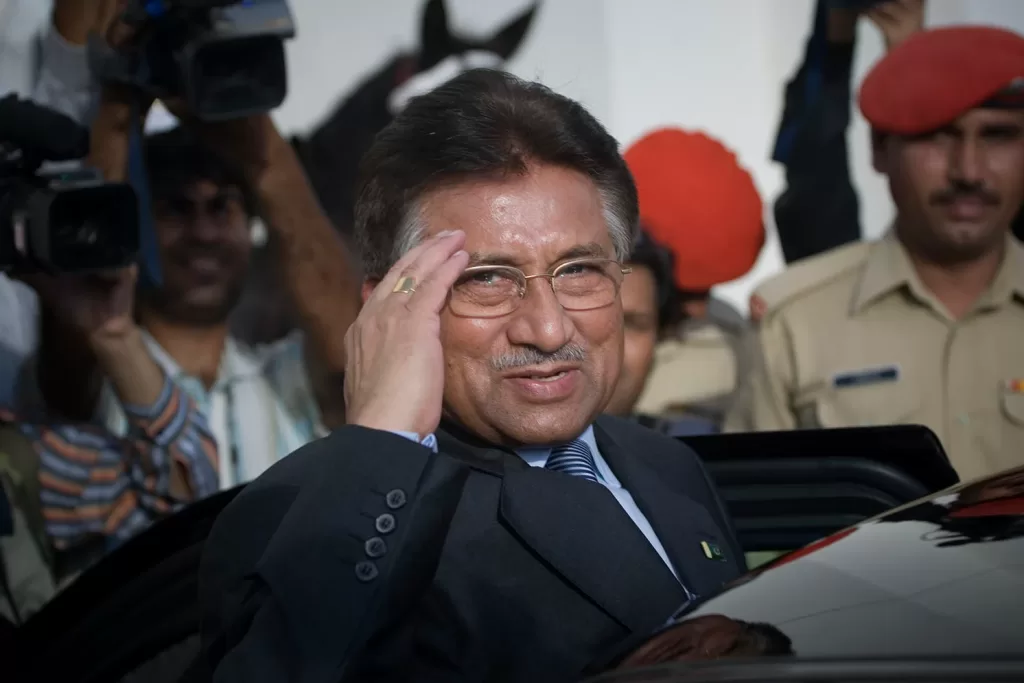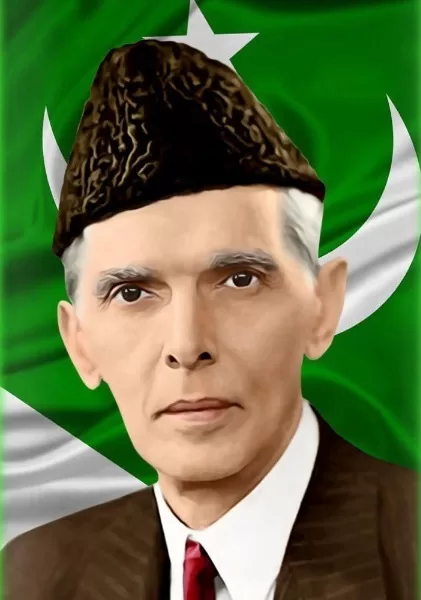Finally, in August 1947, after a lot of campaigning, deliberations and discussions, Quaid-e-Azam Muhammad Ali Jinnah was able to get his Pakistan. By this time, he had exhausted all his energies since he had also been fighting a mortal disease for many years which took its toll a little over a year after the new country was born. The more unfortunate part was that he did not have a successor with the intellectual acumen, capability and foresight to deal with the challenges faced by a new-born country.
Though the new country had been awarded on paper, neither Jinnah nor anyone else in the ranks of his political party had any idea of where its boundaries were until the the 1st of August. It was a joke of history that the Radcliffe Boundary Award was made after Pakistan had been announced. And it seems to be a blunder that Pakistan accepted inclusion of the Muslim majority Gurdaspur in India. This provided India a land route to Kashmir and because of that blunder, Pakistan has suffered for the past 65 years and would probably suffer in the future too. On Kashmir we have fought three major wars with India but the solution to the dispute is still not in sight.
When the new country was born I was 22 years old I saw the formative years of Pakistan as a keen young observer from India before migrating to Pakistan as I always lived with my uncle from nursery upto my college and university days and as he was a member of the elite service in British India which was called Indian Civil Service. 50 he was always posted as 5DM, district magistrate, commonly called Collector and according to the admin system of those days any activity in the district or division, however big or small, had to have a prior permission of Collector sahab.
So anybody, whoever he was a politician, intellectual or poet – for him the first port of call was the Collector’s house and whenever they came to meet him I was always present in those meeting’s as my uncle encouraged me to be there. In this process I had already met practically all the front ranking leaders of all the political parties as well as poets and intellectuals.
After Jinnah’s death under unexplained circumstances (when the ambulance carrying him and his sister mysteriously broke down on its way from Mauripur Military Airport to Karachi) Khwaja Nazimuddin became the Governor General. After the murder of Liaquat Ali Khan, his finance minister Ghulam Mohammad became governor general and although he had a dictatorial streak his was but a ceremonial position. While Liaquat All Khan held all power, the Finance Minister Ghulam Muhammad dis-missed Nazimuddin when the latter challenged his action, and Secretary-General Chaudhry Muhammad Ali who had formed a committee of secretaries under him to make strategic decisions which were sent to the cabinet and passed as they came. Their approval by the cabinet was a mere formality as nobody was competent enough to assess them. Not a single cabinet member showed any political foresight or economic acumen.
From the very first day we have been misled into believing that Pakistan is a democracy or rather an Islamic democracy. Islam had no place for democracy. Throughout the eventful Muslim history, we do not find any democracy. Things have deteriorated a lot since the early period of Islam and the Muslims have lost the powerful place that they once occupied. Since it was born, democracy appears to be the luxury of educated and affluent nations which we are positively not. So if you look carefully, Pakistan had been a dream that our civil and military bureaucracy made us feed upon.
Apart from this, there was a mass exodus of refugees pouring into Pakistan. It was a miracle that they could all be accommodated, in view of India’s refusal to release the funds allocated to Pakistan as a result of partition. This was how we started the new country. There was no accommodation or furniture for the staff of the Secretariat. Some barracks had been hurriedly built for the central secretariat offices but there was no place to sit and many of the clerks had to work standing. There was an acutely in suffident supply of stationery and the staff had to buy these from their own pockets. Instead of pins, they had to use thorns from wild bushes to attach the papers. Despite these problems, their spirit and morale remained high and nobody grumbled. The dream that they had for a country of their own had not yet been shattered; I now wonder where that dauntless spirit and fascinating dream have gone.
From the very first day we have been misled into believing that Pakistan is a democracy or rather an Islamic democracy. Islam had no place for democracy. Throughout the eventful Muslim history, we do not find any democracy. Things have deteriorated a lot since the early period of Islam and the Muslims have lost the powerful place that they once occupied. Since it was born, democracy appears to be the luxury of educated and affluent nations which we are positively not. So if you look carefully, Pakistan had been a dream that our civil and military bureaucracy made us feed upon.

As soon as the leadership that won Pakistan was no more, our civil bureaucracy took up the reins. In the forefront was the Finance Minister Ghulam Muhammad, who later became the governor general, and so was Chaudhry Muhammad Ali who became the Prime Minister. To keep the power in the family they groomed Iskander Mirza who was deputy commissioner of Peshawar at the time of partition. Mirza did not belong to the ICS cadres but to the Indian Political Service (IPS) whose personnel were taken from the army and carried the army ranks.
Pakistan’s first commander-in-chief was General Frank Walter Messervy who had resisted Governor General Jinnah’s orders to send troops to Kashmir as he did not wish for British soldiers on the two sides firing upon one another in the battle-field. He remained C-in-C for a mere six months and was replaced by his deputy, General Douglas Gracey who retired in 1951. British officers commanded Pakistan’s air force and navy too. Pakistan’s Major General Muhammad lftikhar Khan was groomed to be the C-in-C but, unfor tunately, he died in an air crash near Vehari. Inspector General Police Sahabzada Aitazaz, who was carrying the Liaquat murder case file to Karachi, also died in the same crash. It was considered an act of sabotage. This made Ayub Khan, who was a brigadier at that time, the senior-most army officer. By that time the United Nations had intervened and a cease-fire brought out in Kashmir.
In Pakistan, we had our own drop-scene dramas such as change of governments and a new-face prime minister every six months or so on. Meanwhile, Ghulam Muhammad had lost his sanity and a mad man ruled over Pakistan for two years as governor-general.
In 1956, the military-political service bureaucrat Iskander Mirza became the president. General Muhammad Ayub Khan, who was the C-in-C as well as defence minister, decided to take over reins of government and he deposed Mirza. The era of army rule began in 1958. Without doubt, the Ayub rule is considered to be the golden period of Pakistan and under his reforms the country proceeded fast on the path of progress.
Ayub was a great judge of human beings and he built one of the finest cabinets. His Finance Minister Muhammad Shoaib was the father of the industrialization in Pakistan and that continued up to 1965. The economy boomed and other countries envied our phenom-enal progress. However, as it hap-pens under one-man rule, Pakistan blundered into the 1965 war which was such a disaster for us both politically and economically. We are facing its consequences, and paying for it, even today. It was a water-shed and subsequently, after public revolt, Ayub Khan stepped down, handing over power to General Muhammad Yahya Khan.
Reputed to be an army man to the core, Yahya’s greatest weakness was that he was a slave to carnal desires. He rule is replete with stories of his debauchery and lasciviousness. Yet he managed to hold the fairest elections in the history of the country. However, the results of the elections came as a rude shock to some of the influential politicians in West Pakistan, and the civil as well as military bureaucracy which has always conspired to stop people’s rule from taking root in Pakistan’s soil. As a result Pakistan underwent another partition and our majority province seceded after much bloodshed. East Pakistan became Bangladesh and Zulfiqar Ali Bhutto, with the collusion of our generals, became the first civilian martial law administrator in our his-tory, later to become the president and still later the prime minister.
In the polls, Bhutto’s People’s party had won majority in West Pakistan but the absolute majority was with Sheikh Mujeeb’s Awami Party. After secession of Pakistan Mujeeb was thrown into prison where he stayed until Bangladesh was a recognized country. Interestingly, Bhutto played the major role in Mujeeb’s release and recognition of Bangladesh.
I leave it up to political scientists to decide whether Bhutto’s government after the elections was democratic but it remained certain that the army, despite its debacle in the 1971 war, still called the shots; and our politicians always colluded with the generals to come into, or stay in, power.
Bhutto’s rule turned more and more autocratic as time flew, so much so that he let loose a reign of terror upon his opponents and dissidents. Although his party had won the next elections, some ballot tampering was evident and this became his undoing. After countrywide public demonstrations against him, the army ended Bhutto’s rule. His closest friends and allies left him after he was sent to jail, tried in a doubtful case, and hanged in April 1979.
General Ziaul Haq, who once had the reputation of being Bhutto’s most faithful army general, took the reins. He had a religious streak and came into power with a promise to establish Islamic rule in the country.
The worst scenario in Zia’s period was the war in Afghanistan. With the sole purpose of defeating its old adversary, Russia, the United States gave financial and military aid to Pakistan army which knew how to use the tribals against an enemy. After many political and military upheavals, the Russian hegemony in Afghanistan was bro-ken and the government it supported annihilated. However, the long war militarized the entire Afghanistan and even Pakistan, which came under the grip of the “Kalashnikov Culture”
Jihadi organizations and the so-called Islamization process of the country with its distorted versions took over in many parts of the country which later turned into breeding grounds of terrorism. The process went on even after Ziaul Haq’s death in an air crash. After him, Ghulam lshaq Khan, who was the chairman of the senate, took over as President and the Army Chief General Mirza Aslam Beg let it be. Soon after a game of musical chairs began between Mian Nawaz Sharif and Benazir Bhutto and ended with another army take-over by General Pervez Musharraf.

Justified or not, General Musharraf did a good job of government from October 1999 till 2002 but his decisions to become a “Champion of Democracy” forced him to make many a com-promise and he was caught in the dirt that usually comes with politicians and politics.
Musharraf’ greatest blunder was his sudden desire to get the Chief Justice of Supreme Court. The way he tried to make this come about was uncalled for, unethical and crude and the Chief Justice refused to bow down under pressure, and refused to tender his resignation. His colleagues stood by him and so did the members of the legal fraternity. A sort of non-violent movement developed and steadily gained strength. The political parties too, which had been unable to launch any forceful movement against the government so far, got on the band-wagon; Musharraf got unnerved.
In the meantime, elections were held and, against all his estimates, Musharraf’s own Quaid-i-Azam Muslim League party won too few seats and PPP got just so many seats that it could form a government in coalition with Muslim League (Nawaz). As soon as Asif Ali Zardari got elected unanimously with the help of the Nawaz League, he flouted mutual agreements and a friction developed between the two largest parties.
The country that had begun its journey without having developed roots was now shaking with tremors of unprecedented mismanagement and corruption. In the absence of any rule of law only the whim of Asif Zardari prevailed.
After summing up the political upheavals, let us view the movement for Pakistan in retrospection. The most vital and pertinent question facing us is whether the emotions and sentiments that we saw in 1947 were shared by the com-mon people and the aristocracy alike? Or did the aristocracy, bureaucracy and the political leadership have their own self-serving agenda? And how come the religious fanatics got so strong and unruly that we are now faced with suicide bombings and other terrorist activities and our army has to fight them within the country? They seem to have an endless supply of arms and ammunition and have now resorted to a sort of guerilla war that has come into our cities.
History presents two examples of democracy and supremacy of the people’s will: the first example is that of Sir Winston Churchill whose great leadership as the prime minister of Great Britain had won the Second World War. However, the British nation knew that Churchill had completed his job successfully and now another man would be required for the rebuilding of the nation.
The other example is that America where the war of Independence was led by George Washington who, after fulfilling his mission, winning the war and serving the nation as the first president of the country, was not elected for a second term.
But here in our country, anyone who comes to power wants to stick to it by hook or by crook and does not leave until the power of the people or the army gets rid of him. We are at war with the fanatics and facing calamities such as devastating floods, lawlessness and corruption but our leaders’ gravest concerns seem to focus on retaining power at all costs. The most corrupt officials are being posted at the most crucial positions, the government is dragging its feet when it comes to implementing the orders of the courts and action against fake-degree holders is blatantly avoided. Having a fake degree is a criminal charge which should have been left to the law to take its own course but in Pakistan such criminals are safe under the protective umbrella of political parties who are running the affairs of the country.
Any student of history would be convinced that we are heading towards the precipice and whenever such things prevailed in a country, even democracy has not been able to save it. At this moment we need a strong and selfless person who is not fond of worldly riches to bring back the country to safety.
In the history of the world we see such flawless leadership in China’s Mao Zedong, Malaysia’s Mahathir Muhammad, Vietnam’s Ho Chi Minh and Singapore’s Lee Kwan Yew. What was common between them was that were all benevolent despots.
We should not forget Iran where the monarch was a puppet of the Western World. It was Imam Khomenei who deposed him and built one of the most powerful countries able to take on all the world pressures.
Among the democracies, we see India as an example in whose parliament 75 members have criminal records not only of petty crimes but of rape, murder and robbery.
Now it is up the people of Pakistan to choose the course. Are they happy with our politicians who will keep on coming turn by turn and exploit the country and its resources? Or do they want a basic change in our governance infra-structure? It is a difficult question but we have to face it if we want to survive as a respectable nation.♦




